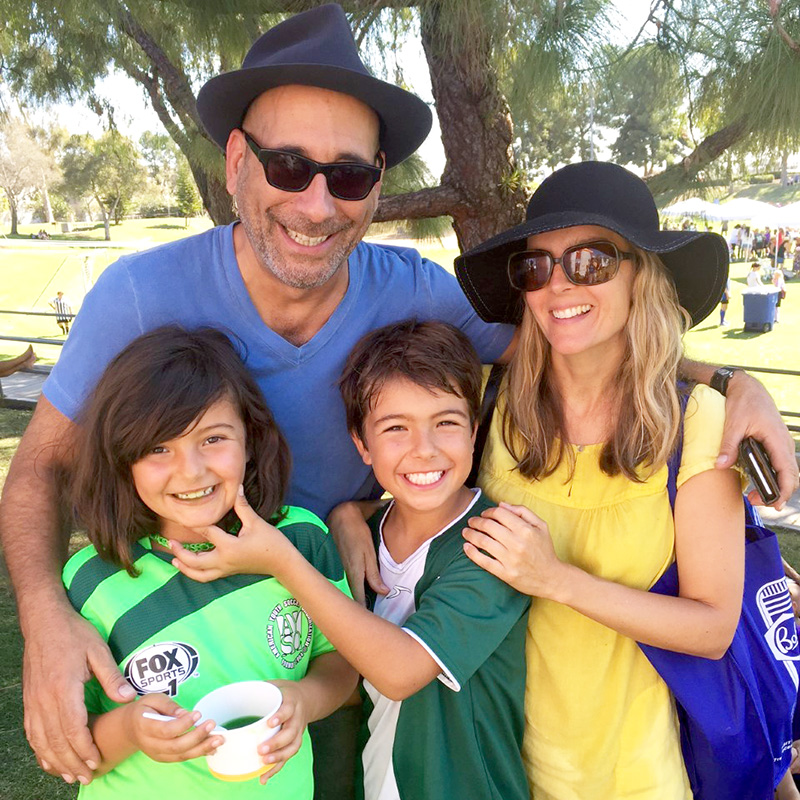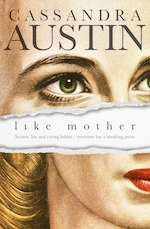All new mothers must do that sometimes I’m sure. But in my case it wasn’t because I was overwhelmed with parenting—it was because I was overwhelmed with where I was parenting. Expectations of a mother change a lot depending on where you live and while I grew up in rural Australia, I am raising kids in the city of Los Angeles, and the difference has made for a lot of teething problems.
“They mistook me for being a nanny.”

Born in rural Australia, Cassandra now lives in Los Angeles with her husband and two children.
The first stumbling block were the playgrounds. Because I gave birth in Australia, when I came to Los Angeles, I took my children to the parks as often as I could and tried to make friends with the women there—not realising that they were not the mothers of the children clutching their hands. They were all nannies or au pairs. Swiss, German, Spanish; Los Angeles is an international city, so the only thing I noticed was that I was an old mother compared to everyone else. Until they mistook me for being a nanny too.
Yes, I am fair and blue-eyed, where my children are dark-skinned and brown-eyed, but it was the fact that my unplaceable Australian accent was different from my children’s newly developed American twang, that meant I must be a nanny too. Did I know whether the children had the same father? Did I know whether the boy and girl were twins? But when the women asked whether I wanted more work and I confessed my status as mother, everything got awkward. A potential spy in the workplace!
I didn’t know any of the mothers employing these women, so could hardly have run to tell tales about their mistakes, but the nannies didn’t know that and they left me alone. So I remained shut out of both worlds—a lonely ghost haunting the playground. And our bathroom.
“No-one wanted to even sit next to my children.”
I hoped to turn this around when my children started school. As soon as they made friends, I could organise playdates and meet some mums. Food might be one way to achieve this. Used as a bargaining chip on school playgrounds, it helps with social hierarchies and games; a perfect tool to soothe situations that might otherwise result in lonely souls.
I know that now.
But before I wised up, I sent my children to school with Vegemite sandwiches and little containers of pickled beetroot. My kids love beetroot in a salad, on burgers and just on its own, and they adore Vegemite because they have been raised on it. But no-one wanted to trade for a slimy, purple vegetable. And no-one wanted to even sit next to the girl or boy with the disgusting brown goop on their bread.
My children complained and I began to get phone calls. “What is Vegemite even made of?” asked one mum. “Why don’t you pack cheese sticks or even Easy Cheese?” suggested another, trying to be helpful.
I thought I was rebelling against the shelves of Ding Dongs, Twinkies and UnCrustables, telling myself this was about nutrition, until I had to face the fact that there is nothing healthy about Vegemite either. I was giving my children Australian food because I was homesick. From then on, my kids had Vegemite for breakfast, and peanut butter and jelly sandwiches in their lunchboxes. And playdates.
“With just a glance, my daughter’s friend conveyed her injury.”
But if food in lunchboxes is one form of currency, birthday parties are another. I don’t doubt that some of the birthday parties for children in Australia are every bit as over-the-top ridiculous as birthday parties for children in Los Angeles. Caterers. A live elephant. Invitations to take a private jet to the ski slopes. Truly.
My poor kids had nothing like that on offer. Their friends had to make do with romps in the park, swims at the beach and homemade birthday cakes (I feel badly about that because I am not the best baker, although I can make any cake look smashing with roses or Lego, even if it tastes like cardboard.) But where I really stumbled were the gift bags.
When I was a child, gift bags were non-existent. Perhaps they came out of LA celebrity culture, where Oscar presenters and other red carpeteers got extravagant gift bags at the events they attended. And call me a slow learner, but despite all the extravagant gift bags my children received from birthday parties they attended as guests, I truly didn’t think they were a necessary part of throwing a party.
Until my daughter’s seventh birthday.
While saying goodbye, her first guest asked sweetly for her goodie bag, and off my daughter’s panicked eyes, I made up an excuse about the goodie bags being locked in the car, suggesting they might turn up at school on Monday. With just a glance, my daughter’s friend conveyed her injury and my daughter could barely hold back her tears. When this scenario was repeated with the next guest, I sent my husband out for bags of candy and small toys, pronto.
The glue that binds community
It’s easy enough to fail as a mother, inevitable in some ways, but failing as a mother in a foreign country at least taught me something—something about how social niceties and small customs like gift bags, are the glue that binds community, a way of showing you care enough to learn how this part of the world works. And mastering these customs is a way of saying to your children, I’ve got this—you’re safe. You are not a stranger in your own country: Even if I sometimes am.
And I think of that mother crying in the bathroom and I laugh fondly at her. If I make a mistake now, well, the word Sorry is as universal as the word Love.
Cassandra’s new book is available now. Like Mother explores what is handed down from generation to generation, and asks us whether a woman’s home is her castle or her cage. (Hamish Hamilton)
How helpful was this article?
Click on a star to rate it!
0 / 5. 0
Be the first to rate this post!
Cassandra Austin
Related posts
Subscribe
Receive personalised articles from experts and wellness inspiration weekly!



